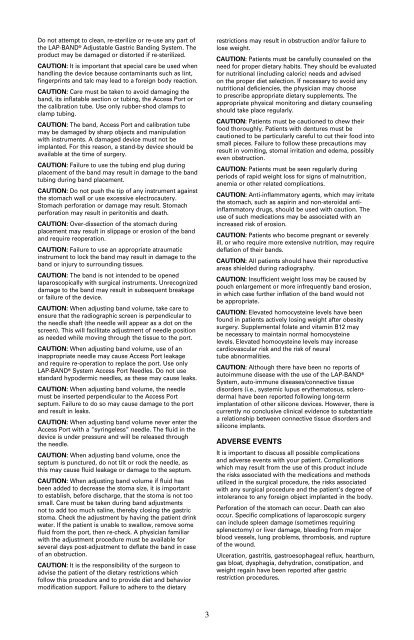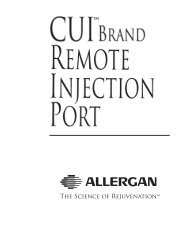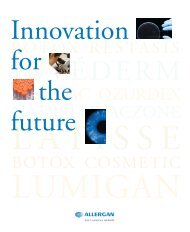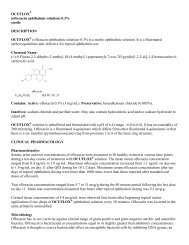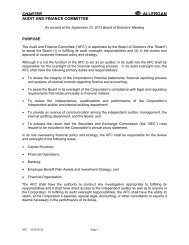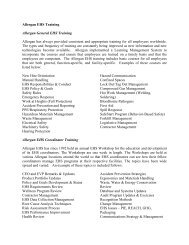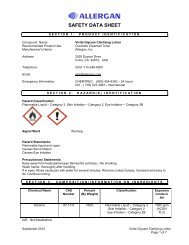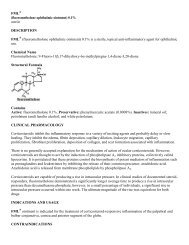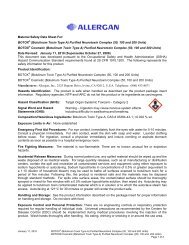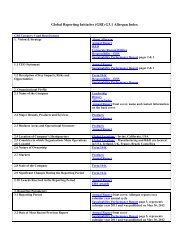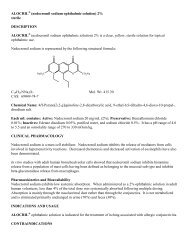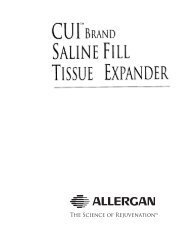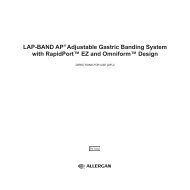LAP-BAND Adjustable Gastric Banding System – [9.75, 10.0 - Allergan
LAP-BAND Adjustable Gastric Banding System – [9.75, 10.0 - Allergan
LAP-BAND Adjustable Gastric Banding System – [9.75, 10.0 - Allergan
- No tags were found...
You also want an ePaper? Increase the reach of your titles
YUMPU automatically turns print PDFs into web optimized ePapers that Google loves.
Do not attempt to clean, re-sterilize or re-use any part ofthe <strong>LAP</strong>-<strong>BAND</strong> ® <strong>Adjustable</strong> <strong>Gastric</strong> <strong>Banding</strong> <strong>System</strong>. Theproduct may be damaged or distorted if re-sterilized.CAUTION: It is important that special care be used whenhandling the device because contaminants such as lint,fingerprints and talc may lead to a foreign body reaction.CAUTION: Care must be taken to avoid damaging theband, its inflatable section or tubing, the Access Port orthe calibration tube. Use only rubber-shod clamps toclamp tubing.CAUTION: The band, Access Port and calibration tubemay be damaged by sharp objects and manipulationwith instruments. A damaged device must not beimplanted. For this reason, a stand-by device should beavailable at the time of surgery.CAUTION: Failure to use the tubing end plug duringplacement of the band may result in damage to the bandtubing during band placement.CAUTION: Do not push the tip of any instrument againstthe stomach wall or use excessive electrocautery.Stomach perforation or damage may result. Stomachperforation may result in peritonitis and death.CAUTION: Over-dissection of the stomach duringplacement may result in slippage or erosion of the bandand require reoperation.CAUTION: Failure to use an appropriate atraumaticinstrument to lock the band may result in damage to theband or injury to surrounding tissues.CAUTION: The band is not intended to be openedlaparoscopically with surgical instruments. Unrecognizeddamage to the band may result in subsequent breakageor failure of the device.CAUTION: When adjusting band volume, take care toensure that the radiographic screen is perpendicular tothe needle shaft (the needle will appear as a dot on thescreen). This will facilitate adjustment of needle positionas needed while moving through the tissue to the port.CAUTION: When adjusting band volume, use of aninappropriate needle may cause Access Port leakageand require re-operation to replace the port. Use only<strong>LAP</strong>-<strong>BAND</strong> ® <strong>System</strong> Access Port Needles. Do not usestandard hypodermic needles, as these may cause leaks.CAUTION: When adjusting band volume, the needlemust be inserted perpendicular to the Access Portseptum. Failure to do so may cause damage to the portand result in leaks.CAUTION: When adjusting band volume never enter theAccess Port with a “syringeless” needle. The fluid in thedevice is under pressure and will be released throughthe needle.CAUTION: When adjusting band volume, once theseptum is punctured, do not tilt or rock the needle, asthis may cause fluid leakage or damage to the septum.CAUTION: When adjusting band volume if fluid hasbeen added to decrease the stoma size, it is importantto establish, before discharge, that the stoma is not toosmall. Care must be taken during band adjustmentsnot to add too much saline, thereby closing the gastricstoma. Check the adjustment by having the patient drinkwater. If the patient is unable to swallow, remove somefluid from the port, then re-check. A physician familiarwith the adjustment procedure must be available forseveral days post-adjustment to deflate the band in caseof an obstruction.CAUTION: It is the responsibility of the surgeon toadvise the patient of the dietary restrictions whichfollow this procedure and to provide diet and behaviormodification support. Failure to adhere to the dietaryrestrictions may result in obstruction and/or failure tolose weight.CAUTION: Patients must be carefully counseled on theneed for proper dietary habits. They should be evaluatedfor nutritional (including caloric) needs and advisedon the proper diet selection. If necessary to avoid anynutritional deficiencies, the physician may chooseto prescribe appropriate dietary supplements. Theappropriate physical monitoring and dietary counselingshould take place regularly.CAUTION: Patients must be cautioned to chew theirfood thoroughly. Patients with dentures must becautioned to be particularly careful to cut their food intosmall pieces. Failure to follow these precautions mayresult in vomiting, stomal irritation and edema, possiblyeven obstruction.CAUTION: Patients must be seen regularly duringperiods of rapid weight loss for signs of malnutrition,anemia or other related complications.CAUTION: Anti-inflammatory agents, which may irritatethe stomach, such as aspirin and non-steroidal antiinflammatorydrugs, should be used with caution. Theuse of such medications may be associated with anincreased risk of erosion.CAUTION: Patients who become pregnant or severelyill, or who require more extensive nutrition, may requiredeflation of their bands.CAUTION: All patients should have their reproductiveareas shielded during radiography.CAUTION: Insufficient weight loss may be caused bypouch enlargement or more infrequently band erosion,in which case further inflation of the band would notbe appropriate.CAUTION: Elevated homocysteine levels have beenfound in patients actively losing weight after obesitysurgery. Supplemental folate and vitamin B12 maybe necessary to maintain normal homocysteinelevels. Elevated homocysteine levels may increasecardiovascular risk and the risk of neuraltube abnormalities.CAUTION: Although there have been no reports ofautoimmune disease with the use of the <strong>LAP</strong>-<strong>BAND</strong> ®<strong>System</strong>, auto-immune diseases/connective tissuedisorders (i.e., systemic lupus erythematosus, scleroderma)have been reported following long-termimplantation of other silicone devices. However, there iscurrently no conclusive clinical evidence to substantiatea relationship between connective tissue disorders andsilicone implants.Adverse EventsIt is important to discuss all possible complicationsand adverse events with your patient. Complicationswhich may result from the use of this product includethe risks associated with the medications and methodsutilized in the surgical procedure, the risks associatedwith any surgical procedure and the patient’s degree ofintolerance to any foreign object implanted in the body.Perforation of the stomach can occur. Death can alsooccur. Specific complications of laparoscopic surgerycan include spleen damage (sometimes requiringsplenectomy) or liver damage, bleeding from majorblood vessels, lung problems, thrombosis, and ruptureof the wound.Ulceration, gastritis, gastroesophageal reflux, heartburn,gas bloat, dysphagia, dehydration, constipation, andweight regain have been reported after gastricrestriction procedures.3


